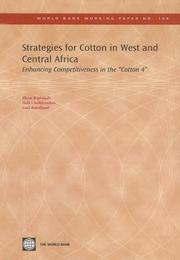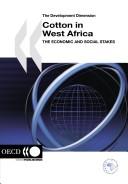| Listing 1 - 2 of 2 |
Sort by
|

ISBN: 0821371312 9786610940318 128094031X 0821371320 Year: 2007 Publisher: Washington, D.C. : World Bank,
Abstract | Keywords | Export | Availability | Bookmark
 Loading...
Loading...Choose an application
- Reference Manager
- EndNote
- RefWorks (Direct export to RefWorks)
Based on comprehensive empirical studies, the paper identifies key reforms and defines strategies to enhance the competitiveness of the cotton sector in West and Central Africa. Lessons learned from the 1990's suggest that transferring public property to private enterprises is not enough, by itself, to put the sector back on a sustainable path. The cotton sector in most West and Central African countries is critical in terms of its contribution to GDP and exports as well as poverty reduction. Until recently, the cotton sector was characterized by a vertically integrated monopolistic structure,
Africa, West -- Economic conditions -- 1960-. --- Africa, West -- Economic policy. --- Cotton growing -- Africa, West. --- Cotton trade -- Africa, Central. --- Cotton trade -- Africa, West. --- Cotton trade -- Government policy -- Africa, West. --- Cotton trade. --- Cotton trade --- Business & Economics --- Industries --- Textile industry

ISBN: 1281737631 9786611737634 9264025065 9264025057 Year: 2006 Publisher: Paris : OECD,
Abstract | Keywords | Export | Availability | Bookmark
 Loading...
Loading...Choose an application
- Reference Manager
- EndNote
- RefWorks (Direct export to RefWorks)
In West Africa, approximately 16 million people depend directly or indirectly on cotton cultivation. Cotton plays a vital role in the economic and social development of many countries, and in improving the livelihoods of the inhabitants. It has also enabled West Africa to become a major player on the international market, since it is now the second largest fiber exporter behind the United States. This success is partly due to an integrated approach which is often called the "cotton system." Since the World Trade Organization's 2003 Ministerial Conference in Cancun, the actors in the international community have recognized the crucial need to address the cotton crisis in an "ambitious, rapid and specific" manner. At the end of the Hong Kong Ministerial Conference in December 2005, progress was made in the negotiations aiming to reduce subsidies, ensure market access and improve development policies. On 24 July, multilateral trade negotiations of the Doha "Development Round" were suspended because an agreement could not be reached which would satisfy both developing and developed countries. This book contends that dialogue between developed and developing countries should continue in order to find a lasting solution to the difficulties facing the cotton sub-sector. It sets out the regional stakes linked to the economic and social importance of cotton in West Africa. It retraces the consultation process on the West African cotton crisis with the aim of finding a negotiated solution acceptable to all parties. Also discussed are the challenges and the measures that need to be taken over the medium and long term in order to prevent this sub-sector's sudden collapse. Countries covered: Benin, Burkina Faso, Cameroon, Cape Verde, Chad, Cote d'Ivoire, The Gambia, Ghana, Guinea, Guinea-Bissau, Liberia, Mali, Mauritania, Niger, Nigeria, Senegal, Sierra Leone, and Togo.--Publisher summary.
Africa, West -- Economic conditions -- 1960-. --- Africa, West -- Economic policy. --- Africa, West -- Social conditions -- 1960-. --- Cotton growing -- Africa, West. --- Cotton growing. --- Cotton textile industry -- Africa, West. --- Cotton textile industry. --- Cotton trade -- Africa, West. --- Cotton trade -- Government policy -- Africa, West. --- Cotton trade. --- Cotton trade --- Textile industry --- Business & Economics --- Industries --- Social aspects --- Economic aspects --- Textile industry and fabrics --- Textiles industry --- Manufacturing industries
| Listing 1 - 2 of 2 |
Sort by
|

 Search
Search Feedback
Feedback About UniCat
About UniCat  Help
Help News
News